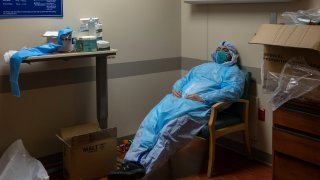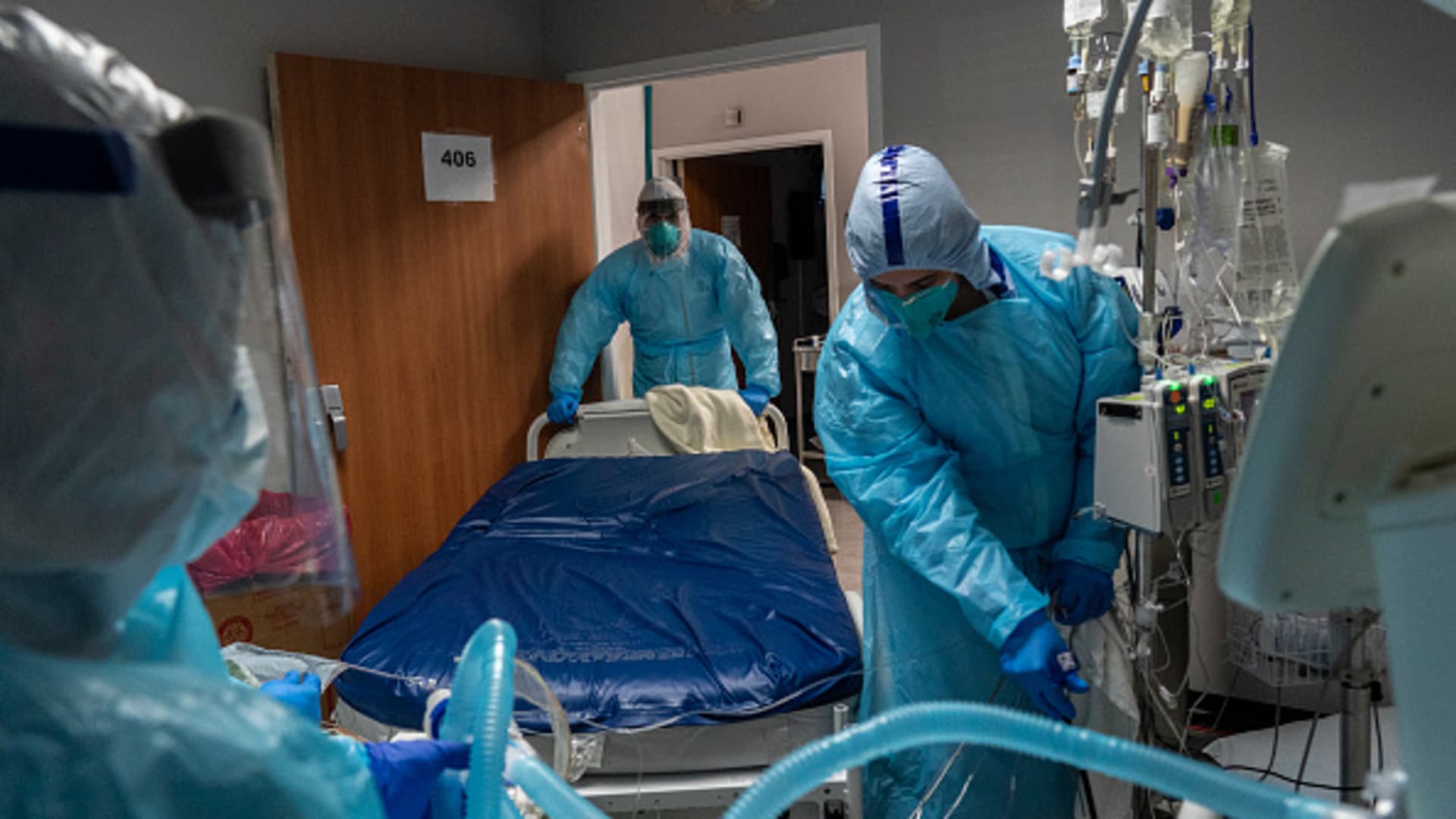
- Around the U.S., hospitals are reaching their limits. There are 104,600 Covid-19 patients in the nation's hospitals, the most at any point during the pandemic.
- Some health-care facilities, especially those in rural areas, have struggled to recruit and retain nurses even before the pandemic, experts say.
- Now, exhausted health-care workers continue to treat sick patients months into the pandemic, even those who don't believe the virus exists, some nurses say.
Tayler Oakes, a 27-year-old travel nurse from Tennessee treating Covid-19 patients at a small Navajo Nation health-care facility, is exhausted.
Working six days a week, Oakes has lived in a motel in a rural part of Arizona since July, assisting patients at a critical access hospital that treats people in dire need of care. Despite the endless hours she and her co-workers have put in, the number of Covid-19 patients is still rising rapidly, she said.
The Navajo Nation extended its stay-at-home order by three weeks beginning Monday after President Jonathan Nez announced that nearly all of the Navajo Area Indian Health Service's ICU beds were full and there's "little to no options" to move patients to nearby facilities, which are also at capacity.
"We are so tired — emotionally, physically, spiritually," Oakes told CNBC. "But then you also have this guilt of like, 'I have to go to work because this isn't a normal job. People are dying.' It's a big moral burden to carry."
The coronavirus is pushing the U.S. health-care system to its limits. But unlike the first wave of Covid hospitalizations in the spring when nurses rushed to hot spots to help care for sick patients, several parts of the country are now simultaneously experiencing strains on their health systems. Relief isn't coming so soon this time, medical experts say, and the health-care workers who are battling the virus are fatigued after months of treating ill patients. In some cases, they're even sick with Covid themselves. A coming vaccine offers hope, but it will be months before it can be widely distributed.
U.S. hospitals are treating 104,600 Covid patient, the most at any point during the pandemic, according to data compiled by the COVID Tracking Project, which is run by journalists at The Atlantic.
Money Report
Over 2,200 people are dying from Covid in the U.S. every day on average, according to data compiled by Johns Hopkins University. States like New York, Massachusetts and Rhode Island have erected field hospitals to prepare for an influx of sick patients. In California, Gov. Gavin Newsom has implemented a fresh stay-at-home order on many residents to preserve the state's ICU capacity.
Dr. Robert Redfield, the Centers for Disease Control and Prevention director, warned last week that the next few months of the pandemic will be among "the most difficult in the public health history of this nation." In another dire warning, White House coronavirus response coordinator Dr. Deborah Birx said Sunday that the winter surge will be the "worst event that this country will face."
Health-care workers and long-term care facility residents will be the first in line for a vaccine when it's cleared for public use, which experts say will help ease the strain on the nation's health-care system. However, the White House task force warned states in its weekly report, which was obtained by CNBC, that the drugs' implementation likely won't help the virus' spread and deaths "until the late spring."
"We're scared, we're tired, we're frustrated," Oakes said. "We're human beings just like everyone else."
Hospitals face staffing crunch
Trusted Health, a company that connects travel nurses with open positions at hospitals across the U.S., has about 2,000 open ICU nursing positions. That's about three times the number of open positions last year, and more roles compared with April when states along the East and West coasts were in desperate need for more medical workers, said Dan Weberg, head of clinical innovation at Trusted Health.
"What's different about this time is that instead of it being in a few states like Michigan, in New York and Washington, Florida early on, now it's a bunch of needs across every state," Weberg said. "And so everyone's in crisis, especially the middle part of the country."
Every hospital typically has a surge plan ready in case of emergencies, such as hurricanes, fires or mass shootings, where they could draw on resources like staffing and equipment from other facilities in the country, said Nancy Foster, vice president of quality and patient safety at the American Hospital Association.
However, those plans assume the needs would be regional, not the broad emergencies hospitals nationwide are now responding to, she said. CDC director Redfield warned during an event hosted by the U.S. Chamber of Commerce last week that about 90% of hospitals in the country are in "hot zones and the red zones." He added that 90% of long-term care facilities are in areas with high level of spread.
"It's really about having the staff to care for people. You can get creative without a bed, but nurses and doctors and respiratory therapists and other staff are critical," Foster said. "And you can't just invent those overnight."

The demand for nurses is especially pronounced in rural parts of the country, where health-care talent has been in short supply even before the pandemic took hold in the U.S., said Katie Boston-Leary, nursing practice and work environment director at the American Nurses Association.
"The work force has become more unstable because the pandemic has challenged nurses, the ones that are working, physically and mentally, and they're getting sick from the disease and in some cases dying," Boston-Leary said.
States like Iowa, South Dakota, North Dakota, Wisconsin, Tennessee, Virginia, West Virginia, Kentucky, Georgia, Florida and Alabama have historically struggled to recruit and retain nurses, she said.
There was also a preexisting need for more nurses in the ICU, where talent has been "decimated tremendously," she said. Nursing homes, where the virus has sickened and killed residents at disproportionately high rates, have never fully recovered from the spring, she added.
'Something we've never seen'
"Nurses are used to being busy. We accept the fact that it's hard work," Boston-Leary said. However, the current surge "is something we've never seen," she said.
In Iowa, rural critical access facilities have struggled to recruit health-care workers like nurses, respiratory therapists and physicians, said Eli Perencevich, an infectious disease physician and epidemiologist at the University of Iowa.
"It's a major issue even without the pandemic, and then when you add that the hospitals are being kind of overwhelmed and when you have staff being sick all the time, it's been really untenable," Perencevich told CNBC on Saturday.
A forthcoming coronavirus vaccine could soon help alleviate some of the burden facing hospitals and long-term care facilities since health-care workers and vulnerable people, like nursing home residents, will be first in line to be inoculated, AHA's Foster said.
"Then you have greater ability to maintain your full staff," she said. "Nobody out because they were exposed to Covid or contracted Covid because they're vaccinated."
Pfizer-BioNTech and Moderna have applied for emergency authorization from the Food and Drug Administration for their vaccines, which could be given the green light in the coming days to weeks.
Moncef Slaoui, who is leading the Trump administration's vaccine program Operation Warp Speed, has predicted that the U.S. should be able to distribute enough vaccine doses to immunize 100 million people by the end of February. That will be enough to protect a "significant portion" of the most at-risk Americans, which are the elderly, health-care workers and people with preexisting conditions, he said.
It could take longer than the Trump administration anticipates to vaccinate the initial wave of people against the disease, according to a STAT News report on Monday. People involved in vaccine planning at health-care systems in California, Illinois, Wisconsin and Kansas told STAT that they'll begin vaccinating their staff in mid-January rather than December.
'They believe it's the flu'
It will still take months for the general U.S. population to get vaccinated against Covid, likely returning to some semblance of normal in late 2021, health experts predict. In the meantime, exhausted health-care workers continue to treat sick patients, even those who don't think the coronavirus is a serious threat.
"I think the hardest emotional thing, and the biggest moral burden for me this year has just been the general indifference toward other people's well-being and the unwillingness to do the things necessary to slow the spread," said Oakes, the travel nurse helping the Navajos.
Oakes said some patients have told her the virus is a hoax, only to succumb to the disease a few days later. Kaithlyn Rojas, a 28-year-old nurse in the Oakland-area, said she has experienced similar indifference toward Covid while treating patients across California.
"I have taken care of some patients who don't really believe the virus exists," Rojas said. "They believe it's the flu, and the numbers are being made up by the government. I don't know who they think is making up the numbers, but they think the numbers are being made up."
States that didn't take extra precaution to slow the virus spread, like requiring mask wearing and encouraging social distancing, have also added to the frustrations nurses are experiencing, Trusted Health's Weberg said.
"Nurses are committed to the community, but it hurts," he said regarding a decision in North Dakota to allow nurses infected with the virus to continue working in the state's hospitals. "It hurts to be able to go into a community who kind of disregarded this disease and now have to pick up the pieces."
— CNBC's Will Feuer and Berkeley Lovelace Jr. contributed to this report.






